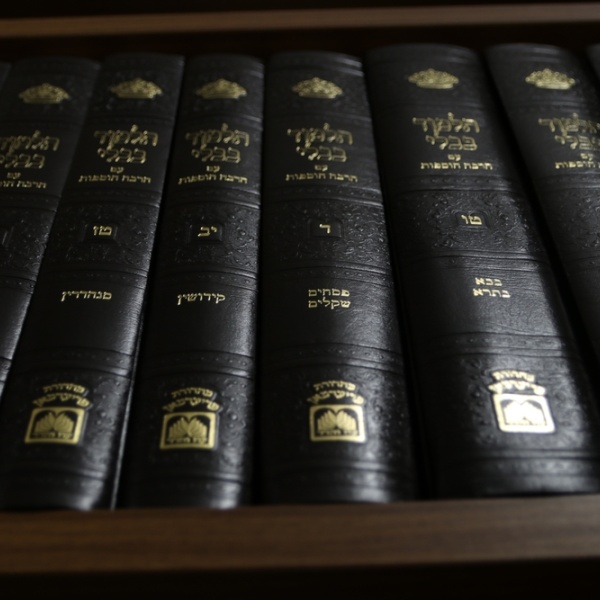
Slow down. Such would be good advice for those trying to navigate a busy street. Running down the street in any major urban area is not recommended unless one literally enjoys bumping into people. And one who does enjoy such would be responsible for damages he caused.
While such seems simple enough this is actually a matter of Tannaitic dispute. “Two people who were in a public thoroughfare, one walking and one running or both of them were running and they caused damage to one another they are both exempt [from liability].” (Bava Kamma 32a)
We must recall that street traffic was a bit different in Talmudic times. Oxen and the like were free to roam the streets and hence owners were exempt from liability for anything their animals may step on. Running in a public thoroughfare was considered normal and acceptable behaviour and thus the no liability was to be assessed if one collides with another. Being that both are well within their rights we can just as easily say that Reuven bumped into Shimon as we can that Shimon bumped into Reuven. They are, the Mishna teaches, equally to blame and we can apply the teaching of Rav Pappa that “if both have permission or if both don’t have permission if either causes harm to the other he is liable but if they cause damages to each other they are exempt.” (Bava Kamma 48b) Incidental contact is inevitable as no liability can be assessed. Interestingly this exemption holds true if neither have permission to be in their location as would be the case if they are both trespassing on another’s property. While two wrongs don’t make a right they may help save one from a lawsuit.
If only one of the parties is there without permission he would be required to pay for incidental damages caused by a collision. And if the damage is not incidental then the one causing the damage must pay regardless of location even if he is not at fault as discussed in our last post.
While the principal involved is pretty straightforward applying it is not. What is incidental and what is not would need to be decided in a court of law. Interestingly the Gemara spends little time discussing such details. What it does discuss is the view of Issi ben Yehuda who, unlike the Mishna, argues that running in public is not acceptable behaviour and one who runs is liable even for incidental damages if and when he knocks someone or something over. Issi ben Yehuha would agree that if the second person is also running the first is thereby exempted from liability. Once again while two wrongs may not make a right they can save you some money.
There is a fascinating even beautiful exception. “Issi ben Yehuda agrees [with the Sages] on erev Shabbat bein hasmesot, at twilight on Friday, that he is exempt as he is running with permission.” (Bava Kamma 32a)
The Gemara explains that the permission is that of Rav Chanina who declared “bou netze likrat shabbat kallah malceta, let us go out and greet the bride queen.” (Bava Kamma 32b) Many of the commentaries note that is a special dispensation applicable only to Shabbat. One who runs to go to a shiur, visit a sick person in the hospital or any other mitzva may have a good reason to run but such does not excuse him from liability. Keeping mitzvoth is great but never at the expense of another. That is why an employee must curtail his davening on the job, one who places his Chanukah candles on the street (where they ideally belong) is responsible if a passerby causes a fire (Bava Kamma 62b). But Shabbat is different. It is not a personal mitzva observed by some individual but the great gift given to the Jewish community[1]. One and all should be running on Friday afternoon as they hurry to greet the Shabbat queen. But as Shabbat enters the hustle and bustle of people scurrying about gives way to the quiet serenity of the Shabbat. As our Sages note “our walking on shabbat should not be like our walking on the weekday.”
When one makes a siyum on a Talmudic tractate we give thanks that we are given the opportunity “to run to the world to come.” It is Shabbat which is mein olam haba, a taste of the world to come. Fortunate are those who are able to run to greet the Shabbat queen.
[1] The law exempting those running as Friday afternoon turns to Shabbat would of course only apply in the land of Israel. Our observance of Shabbat does not give us license to inconvenience non-Jews. Even the laws of Shabbat can be included in the special mitzvoth “that are dependent on the land.”
